Let Me (Try To) Entertain You
RVM Programs and the Pandemic
by Bob Buddemeier
Remember when? Back in the (pre-COVID) day, almost every Thursday evening and some Tuesdays, there would be live entertainment in the Manor auditorium. Mostly a wide variety of kinds of music, but also occasional dance, lectures, or other performances. Programs are funded by the Residents Council, with occasional chip-ins from the RVM Foundation
All were booked and arranged by Mary Jane Morrison, chair of the Program committee. Bert Chumbler handled the technical set up and advertising, and Ollie Sontag looked after seating and getting in the residents from the licensed facilities. Jo Ann Basin and I helped out around the edges with programs, thank-yous, etc. It was a comfortable routine, with auditorium-only shows – “live performers deserve a live audience” was Mary Jane’s position.
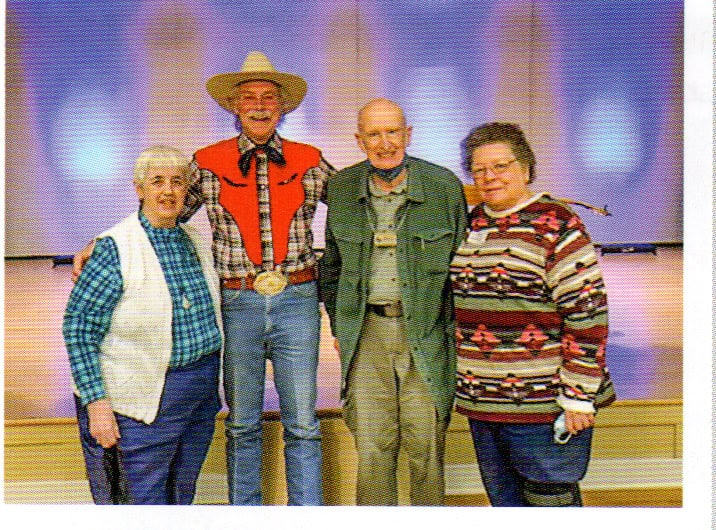
L to R: Mary Jane Morrison, Performer Marty Davis, Bert Chumbler, Ollie Sontag
Then — the dreaded virus. Suddenly, a whole new dimension was added to the “live” in live audience and live performers, and keeping them literally alive meant not having them present alive in person.
And yet, a locked down community needed entertainment and distraction more than ever.
As the saying goes, when the going got tough, the tough got going, and as soon as Mary Jane could get approval to have outsiders back in the auditorium, we started having Thursday evening programs broadcast on Channel 900. The process, over more than a year and a half of the pandemic, went through multiple stages as shown in the chart. From the original regime, we went through the initial shut-down and then into the televised restart.

Restarting programs involved major booking problems – since people could not get together to rehearse, almost the only groups available were solo performers or husband and wife teams. Until social distancing and lockdown controls relaxed, we could get no orchestras, choruses, dance studios, etc. Fortunately, some of the local performers were ready to step in on short notice, and Sarah Karnatz graciously shared her list of Bistro performers, some of whom accepted auditorium gigs. Although artists are permitted to remove their masks while performing, all performers must be vaccinated in order to be booked.
An important contributor to the shift to Channel 900 presentations was Mike House, RVM staff AV technician. He had always seen to the sound quality for the auditorium show, but now he took over the tasks of broadcast and recording quality control as well as on-stage sound.
When restrictions loosened up somewhat, more groups became available for booking, but the auditorium was pressed into use as a dining venue. Both the shows and the dinners managed to get done, but it was sometimes an uneasy compromise. While the auditorium was being used for dining, there were difficulty adjusting sound levels, and sometimes competing noise from the diners. Some performers found dining sounds (dishes & chatter) bothersome and felt it lessened the quality of their performance.
As it sometimes will, progress happened, and RVM began to transition to new video equipment and software. And as is almost always the case, progress was not smooth and simple – for a number of weeks it was necessary to record the performance on one Thursday, and play the recorded version on Channel 900 the next Thursday. This arrangement was generally confusing and frustrating for all involved.
However, we are now back to relative normality – the broadcast system is working, the auditorium isn’t used for dining, and we are able to bring in medium-sized groups. But set aside relative normality – will it ever be absolute? Mary Jane says she hopes that we can go back to live audiences by September 2022 at latest – maybe Spring, with luck. In the meantime, she says that “What is missed most is feedback from the viewing audience. Performers often tell us how much harder it is to perform to no audience.”
As long as occupancy restrictions are in effect, we will stick with broadcast only rather than trying to ration a limited number of seats among the residents. When restrictions are finally lifted, Mary Jane plans to try an experiment: “When we open up to a full audience (100-150) we’ll still broadcast over Ch 900 provided that there is still a respectable size audience in the auditorium – otherwise we’ll have to limit it to auditorium only.”
One of the other problems with broadcast-only is that we have no idea about the size or reaction of the audience. If you are watching and enjoying the program, let one of the Committee members know. It helps to ensure that the show goes on.

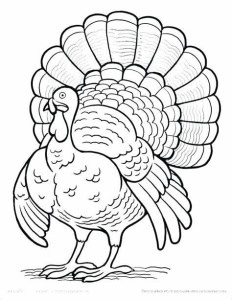
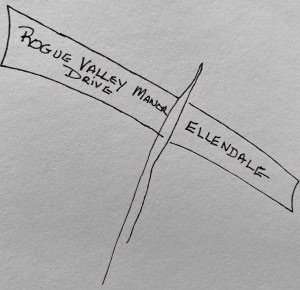 I’m going up the hill past the golf course and, oh, oh. I must have taken the wrong turn looking at those turkeys.
I’m going up the hill past the golf course and, oh, oh. I must have taken the wrong turn looking at those turkeys.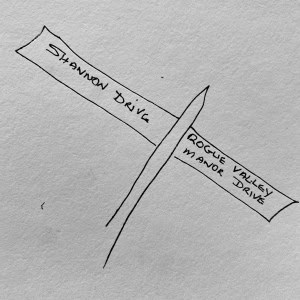 turkeys for Thanksgiving, reindeer for Christmas— what happens on Groundhog Day? But, what the…? I’ve got to keep my eyes on the road—look, the street sign says I’m now on Shannon Drive! I swear I didn’t make a turn.
turkeys for Thanksgiving, reindeer for Christmas— what happens on Groundhog Day? But, what the…? I’ve got to keep my eyes on the road—look, the street sign says I’m now on Shannon Drive! I swear I didn’t make a turn.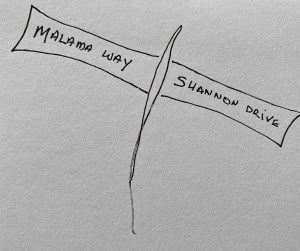 That’s GPS, not CBS. But Mom, can you believe it? Now she’s telling me I’m on something called Malama Way. What’s a Malama?
That’s GPS, not CBS. But Mom, can you believe it? Now she’s telling me I’m on something called Malama Way. What’s a Malama? 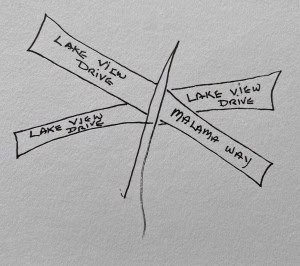 those other two. Half way down the block, look for me. I’ve got a new hairdo, that’s why I’m wearing that blue dress so you’ll be sure it’s me. Oh, I see your car now. You hoo! Here I am. And here you are. Now, wasn’t that simple, sweetie? Those pilgrims didn’t need silly street signs to find Plymouth Rock, did they?
those other two. Half way down the block, look for me. I’ve got a new hairdo, that’s why I’m wearing that blue dress so you’ll be sure it’s me. Oh, I see your car now. You hoo! Here I am. And here you are. Now, wasn’t that simple, sweetie? Those pilgrims didn’t need silly street signs to find Plymouth Rock, did they? 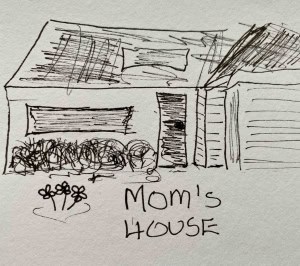

 My novels have routinely taken six years to finish. Why? Working fulltime, many other distractions, and sheer laziness. Add in my favorite activity of reading other author’s novels, and you get the picture.
My novels have routinely taken six years to finish. Why? Working fulltime, many other distractions, and sheer laziness. Add in my favorite activity of reading other author’s novels, and you get the picture. Editor’s Note: Copies of Madge’s new novel will be available at the Craft Fair on November 1 in the Auditorium.
Editor’s Note: Copies of Madge’s new novel will be available at the Craft Fair on November 1 in the Auditorium.

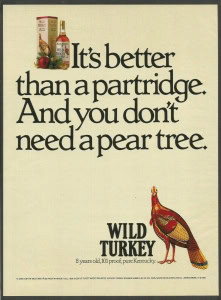
 by Bonnie Tollefson
by Bonnie Tollefson


